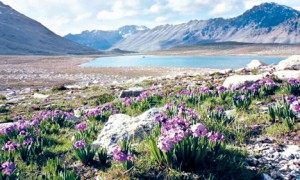Pak-India urged to benefit from Gilgit-Baltistan in connecting South and Central Asia
Monday, November 12th, 2012 12:30:27 by News Pakistan Admin
Pakistan and India urged to benefit from Gilgit-Baltistan in connecting South and Central Asia London (PR) The UK based think tank The Henry Jackson Society, in collaboration with the Washington based Institute for Gilgit Baltistan Studies, held an event titled “Gilgit-Baltistan: South-Central Asia’s Socio-Economic Integration and Regional Politics” at the House of Lords which focused on reviving the infamous southern branch of the Silk Route to help transform the resource-rich region from being a battleground of three nuclear states into a hub of trade, tourism, economic integration and cultural exchange.
Lord Sir Clive Soley of Hammersmith facilitated the discussion and the panel consisted of Mumtaz Khan, Executive Director of International Center for Peace and Democracy, and Senge H. Sering, President of the Institute for Gilgit Baltistan Studies.
The speakers observed that revival of travel across the line of control between Gilgit-Baltistan and Ladakh would help more than ten thousand divided family members reunite after almost seven decades.
At the same time, it will help revive the Himalayan culture to counter rapidly growing extremism and transform the economy of the poverty stricken disputed region. Gilgit-Baltistan can interlink Central Asia with Ladakh, Nepal and Tibet which will boost potentials of eco-tourism and bring much needed revenue. He said that the recent statements by US Foreign Minister Hilary Clinton on reviving the Silk Route were encouraging to bring Gilgit-Baltistan into the limelight.
Addressing on the occasion Senge H. Sering, President of the Institute for Gilgit Baltistan Studies emphasized upon Pakistan to revise and standardize its policy viz. a viz. the confidence building measures (CBMs) on different regions of the former princely state of Jammu & Kashmir including Gilgit-Baltistan. He said, “The people of Gilgit-Baltistan deserve to enjoy same travel facilities like the one currently exists between Kashmir and Muzaffarabad.
“The idea of liberalizing trade between India and Pakistan cannot materialize if the border remains open for some people while closed for the others”, he said, adding “ Gilgit-Baltistan has the potential to enhance regional trade to tens of billions of dollars however; such a trade should be able to bring prosperity to the local people while promoting political stability in the fragile region.”
He suggested that parliamentarians and cultural and sports troupes from Gilgit-Baltistan and Ladakh should be allowed to hold joint performances, and music and polo and archery tournaments should be initiated across the LOC. He proposed establishing joint institutions to monitor the glaciers. He urged both governments to open bank branches across the LOC in Gilgit-Baltistan, and help local cottage industry including carpet making become a profitable business. He said that children under the age of 10 and the aged above 60 should have visa free travel between Gilgit-Baltistan and Ladakh. He proposed a drastic reduction in troop placement along the LOC. He asked governments to introduce special packages for tourists who apply for multiple destinations extending from Central Asia and Afghanistan to Nepal and Bhutan. He told that Central Asia has the potential to supply abundance of natural resources to both India and Pakistan and Gilgit-Baltistan can help those dreams materialize. “A resource starved country like Pakistan cannot afford to spend more on wars as the citizens do not have adequate access to electricity, heating, water, cooking gas and fuel for vehicles and industries”, he said.
He concluded that China’s role in South Asia will increase with the possible withdrawal of NATO forces from Afghanistan, which puts sudden excessive pressure on the land, society and resources of Gilgit-Baltistan, and that Pakistan and China should respect the concerns and demands of the locals in this regards.
Mumtaz Khan, Executive Director of International Center for Peace and Democracy, described how closed borders, a lingering war and presence of armed forces and Taliban affiliated militants have impacted the religious, cultural and economic composition of Pakistan controlled Kashmir and Gilgit-Baltistan, and how the opening of trade routes could contribute towards greater stability in the region.
He opined that the rise in sectarian killings was infectious and was spreading to every part of Pakistan, including in Pakistan administrated Kashmir. He reiterated that closed borders only help areas like Kashmir and Gilgit-Baltistan become spawning grounds for the terrorists.
“The people of the Himalayan regions will confront the extremist elements and become allies of democratic governments when they will see monetary benefits coming from liberalized trade, tourism and travel across the ancient Silk Route”, he added.
Governments cannot reform the societies on their own and they need to rely on local communities as their partners in eliminating terrorism.
It will happen when economic prosperity will enable the poor families to send their children to regular schools instead of Jihadi madrassas.”
He also urged the governments of India, Afghanistan and Pakistan to expedite work on the TAPI gas line which will interlink economic destiny of all these warring nations. He talked about Indo-China trade models which has help commerce boom to over 70 billion dollars despite lingering border disputes. He said that border disputes should not be used as an excuse to deprive people of Kashmir and Gilgit-Baltistan the right to free travel and trade with their kith and kin across the LOC.
In the end, Senge Sering thanked the Henry Jackson Society and Sir Clive Soley for their role in materializing this event and bringing a better sense of understanding among the participants about the issues of Gilgit-Baltistan and Kashmir.
Short URL: https://www.newspakistan.pk/?p=34887

















